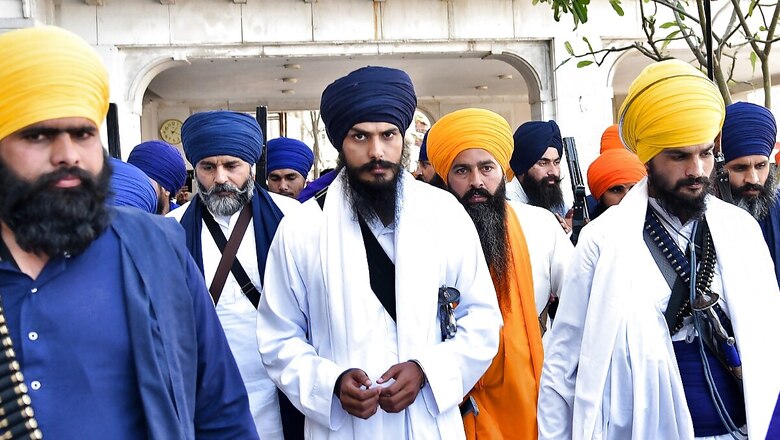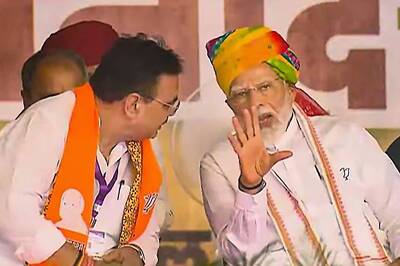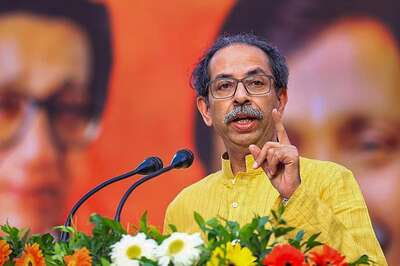
views
Amritpal Singh’s sudden rise to fame and power has reignited fears of a revival of Khalistan demand. Though he was just a truck driver in Dubai, his return and taking up the cause of Khalistan along with the prevailing decadence caused by massive drug addiction among the youth of Punjab, and the religious conversions being coordinated by missionaries from Kerala, needs to be understood in its correct perspective.
Drug trafficking and drug addiction plaguing Punjab is a very old story. The failure of many governments in the state to handle the issue firmly has led to the ruination of lakhs of families. Simultaneously, the drug trade has spread its tentacles deep into the political landscape and the bureaucracy, which has led to the suspicion and fear that many top officials and politicians have been compromised and hence, the reluctance to fight the problem seriously.
Drugs are also being pumped from across the border, adding to the severity of the problem. Distressed parents, hampered by inadequate treatment facilities for their wards, inability to defray the medical expenses, and facing legal cases and the consequent expenses, are distraught that the government is unable to stop the menace.
Punjab has, of late, become a hotbed of religious conversions. Already, severely afflicted by narcotics and Khalistan issues, this new menace, ignited by American-trained Christian missionaries and managed by Kerala evangelical groups, adds to Punjab’s woes.
The average Sikh view this as an attempt to destroy Sikhism. The sudden spurt in conversions is targeting the Mazhabi Sikhs and Dalit Hindus, to renounce their ancestral faith and switch loyalties to the foreign faith – Christianity. Like elsewhere in India, money plays a big role in Christian conversion activities.
Influential families of economically weaker sections are lured by money and other material goods to change their faith. Thereafter, these families are engaged on a commission basis to bring in their relations, friends and acquaintances, who are enticed to convert. The new converts are also tasked with getting more converts. In this way, the conversion game starts escalating in geometric progression. In order to not alert the authorities and political parties, the conversions happen very subtly and innocuously. The converts are strongly compelled to retain their Sikh/Hindu names, caste identities and lifestyles.
Another new dimension introduced in the conversion process is to copy Sikh Bhajans and Kirtans verbatim, the only change being the substitution of a foreigner’s name. The converts are made to believe that their erstwhile religious practices were devil worshipping or Satanic in nature. They are made to feel remorseful, guilty and are told that atonement is possible only by worshipping the foreign god. Over a period of time, this feeling gets deeply ingrained, leading to them becoming hardcore and intolerant fanatics, paving the way for big changes in the political and social scenario.
Islam is the only religion that has successfully resisted the Christian conversion agenda. On the contrary, Hinduism, Sikhism, Jainism and Buddhism are pacifist, docile believers in Karma, and significantly believe in the equality of religions. In any clash between a foreign faith and indigenous faiths, the former has an overwhelming advantage because of their aggressive beliefs, and indigenous faiths that teach ‘Sarva Dharma Sama Bhava’ have to pathetically watch their followers being snatched away.
But, religious conversions have other far-reaching ramifications, especially in the political equations. The immediate fall-out of conversions is the commencement of political games to become the determining factor in every electoral constituency. Minority votes are traded in bulk to those political parties that will allow the missionaries to have a free run in more conversion activities. Thereafter, other demands are bargained in exchange for votes, like, free trips to Jerusalem, job reservations, monetary grants for building churches, tax benefits, land allotments and monthly stipends for pastors.
More conversions mean tightening of their vice-like grip on political parties. The power centre itself shifts to the residences of pastors’ and bishops’ palaces. Politicians have no other alternative but to prostrate and plead before these padres, pastors and bishops. This is what is happening in the Southern and Northeastern states and tribal belts. The epidemic is now attacking Punjab.
Exact estimates of those converted in Punjab are kept a closely guarded secret. Some estimates presume that in the last 11 years, the number of Christian converts shot up from just 1.5 percent to a whopping 15 percent. Neither the state nor the Central government realised the gravity of these conversion exercises going on in this sensitive border state.
While luring and enticing fresh converts is going on in full swing, many of them are living in the chimaera of equality, little realising that this foreign faith is itself having innumerable caste-like rigid divisions, referred to, euphemistically, as ‘Denominations’.
A new caste division referred to as ‘Dalit Christians’ has been added by these pastors and bishops. A whole new set of belief systems has emerged placing faith in European godmen and women, angels, miracles, devils, Satan, and heaven and hell. The landscape of Punjab itself will soon change as monstrous churches will get erected at vantage points to emphasise their clout and presence.
From where is the money flowing in for constructing such massive churches and other connected buildings? No agency takes up these cases for investigation. Crores of rupees are being invested across the state in building massive churches. Predictably, clashes have started erupting between Sikhs and these new converts.
Alarmed by the ongoing conversions, the Akal Takht, the highest political institution of Sikhs, has condemned the forced conversions by Christian groups and demanded a law against such conversions. On August 30, 2022, masked men vandalised a church in the Tarn Taran district, on the border with Pakistan, and set the pastor’s car on fire.
A group of Nihang Sikhs protested against a conversion event organised by Christian missionaries at Daduana village in Amritsar district on August 28, 2022. The Shiromani Gurudwara Parbandhak Committee (SGPC) has started a dharam prachar lehar (wave of religious preaching) in rural Punjab, specifically targeting the border areas, where active conversions are being engineered. Teams of Pracharaks (sermon givers) spread out to propagate the Sikh faith in each village for a week. But such measures are not sufficient to keep at bay the aggressive foreign-funded and trained converters.
In a landmark 1977 judgement in Stanislaus vs State of Madhya Pradesh, the Supreme Court held that Indians have no fundamental right to religious conversion. The court made a distinction between the right to propagate one’s religion or faith and the right to convert. Even though the right to religion is guaranteed by Article 25 of the Constitution, the court said religious conversion does not enjoy such protection.
The ISI of Pakistan will be keenly monitoring the conversion exercises going on in different parts of Punjab, and if they decide to step in, Punjab will slip into chaos and witness clashes between Sikhs and Christian converts. While the Sikhs are trying to defend their faith, missionaries are trying to impose a new faith.
Both Central and state governments have been treating the problem of conversion very lightly, hence the nation is seeing rampant foreign-funded conversions in most Southern states and even far-flung areas like Tawang and Uttarakhand. We need to see Amritpal’s intervention and the rise in Punjab as his desire to play the role of a defender of his faith, and Sikh Gurus.
The government has a solemn obligation to defend the indigenous faiths, and if it fails in that duty, the likes of Amritpal Singh will necessarily step in. His 29-day journey from Amritsar to Anandpur Sahib to encourage Sikh youth to follow the tenets of Sikhism and shun drugs, is basically what the government should have done.
The author is IRS (Rtd), Ph.D. (Narcotics), Former Director General, National Academy of Customs, Indirect Taxes & Narcotics (NACIN). Views expressed are personal.
Read all the Latest Opinions here




















Comments
0 comment